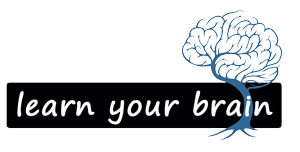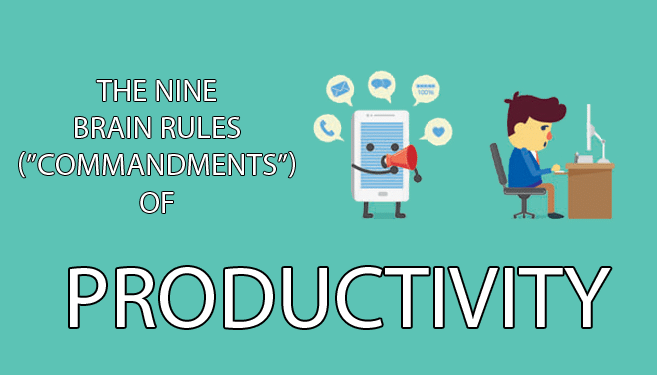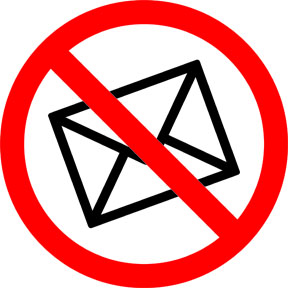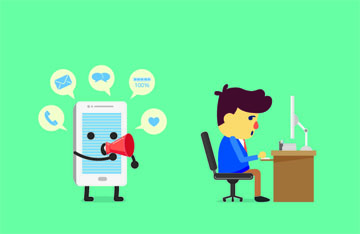In our society, we have to constantly be busy, busy, busy or else we’re “lazy”. You hear people bragging all the time about how many hours they work. So it makes everyone feel like we have to up our game.
Part of the problem is that we struggle to identify what is essential to get done. So everything on our task list feels equally important.
All of this leads us to feel guilty if we don’t check off those 20-30 things on our to-do list. Nevermind that it would be physically impossible to get everything done.
You may see everyone around you as incredibly stressed, so you feel like that’s the natural way to be.
Ironically, this push to get more and more stuff done and to maximize our productivity has actually made us less productive as a society. In the frantic busy-ness of our world, most people have developed some bad habits that actually kill their productivity.
These habits give us the false illusion that we’re really productive. But in fact, we’re just busy. And there’s a huge difference between being busy and being productive.
So let’s go through these mistakes one-by-one, and give you some brain rules you can follow for much greater productivity.
Mistake #1: The more hours I work, the more productive I am.
Brain Rule #1: Productivity is not about the number of hours you work, it’s how well you manage your brain and your energy during the day.
This is the biggest mistake of them all. We often hear people bragging about how many hours they work.
But just because you work a lot of hours doesn’t mean they’re productive, efficient hours.
Maybe your pattern is to work beyond the point of mental and physical exhaustion.
This way of working shuts down the parts of the brain that can access creative solutions and depletes your valuable supply of mental and physical energy.
And when you’re depleted and tired you’re much more likely to get distracted and to distract yourself and others. You’re also more likely to work on tasks that are low value and don’t really move you ahead.
There are people who get more done in one hour than other people get done in a full 8 hour work day. They’re not smarter or better than anybody else. They’ve just learned how to harness the energy of their brain and direct it towards a task.
There’s a new paradigm about productivity that is emerging now that we understand the brain better:
Most people look at their day as one long marathon: you get up and you work steadily through the day until you go to bed.
The new paradigm, proposed by performance coaches Jim Loehr and Tony Schwartz in The Power of Full Engagement turns that old paradigm on its head.
The problem with the old way of working is it doesn’t consider the limitations of the brain.
Instead of treating your day like one long marathon, look at your day as a series of shorter sprints.
Break up your day into chunks of shorter periods of intense activity (being in flow), followed by a brief period of rest and rejuvenation. Then do another period of intense activity (flow), and then another period of rest.
Your brain will supercharge its creativity when you switch between concentrated focus and relaxation.
Here’s a statement that might shock you a little: Working more hours can actually hurt your productivity and make success come more slowly. We explain this in depth in the following section.
Mistake #2: You expect too much of yourself and your brain.
Brain Rule #2: Attention, focus and energy are all limited, depletable resources.
Most of us expect way too much of ourselves and think we can get way more done than we really can. We just don’t understand how very limited our mind is.
We also underestimate how little time we can work before we lose attention, how easily we get distracted, and how much energy thinking uses up.
The Limitations of the Mind
Imagine that your mind is like a tiny stage. On this stage, you can only fit 3-4 actors (different thoughts) at a time.
And all of those actors can only be working on one scene! They can’t each be doing their own different monologue.

Your mind is like a small stage-you can’t fit much on there and it takes a lot of energy to run stuff behind the scenes.
It still takes a lot of energy to get the show underway–all the lights and crew behind the scenes are working really hard to perform each scene.
Just like performing the show takes a lot of energy, using your conscious mind to think is actually very energy hungry.
Psychologists know that you can only sustain your focus for 60 to 90 minutes at a time (at the absolute most). This is especially true when you’re working on tasks that require deep thinking.
The more “energy hungry” the activity is, the less time you can work on it before your brain gets tired.
It’s always surprising to learn how short a time you really have where you can give undivided, sustained attention. So if you work beyond this time limit, you are working with diminishing returns. You will have fewer good ideas, you will make more mistakes, etc.
Pushing yourself to work longer than 90 minutes on energy hungry tasks always leads to mental fatigue and distractibility.
Writing e-mails, developing a strategy for some aspect of your business, and prioritizing different tasks are examples of very energy-hungry activities.
We have a limited bucket of energy for activities like decision making and controlling our impulses. When the bucket is almost empty, we don’t have much willpower left over for the next activity.
When you don’t realize how very small the stage of your mind is, you give yourself totally unrealistic deadlines and way too many things to tackle.
That’s why we suggest putting only 2-3 high-priority tasks on your to-do list for the day. Make sure they are high lifetime value or high dollar tasks that will move you forward in a big way.
Putting fewer things on your to-do list also helps get rid of the frustration you may feel because you never finish what you had planned for the day.
Mistake #3: You don’t schedule important, energy-hungry tasks when your brain is at its best.
Brain Rule #3: Always schedule tasks with your brain in mind.
Not all tasks are created equal when it comes to how much energy they consume. Make sure you do the most energy-hungry thing when your brain is at its sharpest.
Here’s a nice rule of thumb to live by:
Do your creative work first instead of your reactive work!
Take some time to write down your list of 2-3 priorities for the day. Prioritizing is itself an energy-hungry activity but it’s an extremely helpful one.
Then, from your list of priorities, pick the one activity that is both the highest priority AND requires the most mental energy (anything to do with planning, writing, or heavy thinking) and start your day with that.
That way you’re doing the most important, most difficult activity when your mind is fresh.
Most people make the mistake of checking their e-mail first thing in the morning. This is a problem for two reasons:
- checking your e-mail is usually not a high-priority activity. So you’re starting off your day by consuming information and by getting sucked into other people’s agenda–starting your day in “reaction mode.”
- reading and responding to e-mail is a very “energy-hungry” task, so you’re depleting your precious store of mental energy on a task that doesn’t really move you forward
Your brain has natural ebbs and flows for when it’s freshest and has the most energy. Some people are naturally “morning people” or “night people.” So don’t worry if you can’t seem to think early in the morning or late at night. It’s your brain’s natural rhythms; it’s not something wrong with you.
If you can, take advantage of when your brain is at its sharpest to do your most energy-hungry, highest-value tasks.
It’s also helpful to block your time with activities based on brain use rather than topic. You’ll be a lot more efficient and productive if you work in chunks of time focused on similar types of activities.
For example, you can schedule a block of time or two during the day specifically to read and respond to e-mails. In addition, you can schedule a chunk of time when you can deal with administrative tasks or details like paperwork. Do your best to schedule these blocks of time when you don’t have as much brainpower, like in your early afternoon slump, or towards the end of the day.
An advantage to scheduling your time like this is that it also allows your brain time to recover.
Mistake #4: You ignore your body in the push to get things done.
Brain Rule #4: Take care of your body and your productivity will flourish.
The lie that we keep telling ourselves is that we don’t have time to take breaks and take care of our bodies.
The reality is that the brain and the body are deeply interconnected. When you do something to help the body, it also helps your brain so you can think more clearly.
According to John Medina in Brain Rules, we haven’t evolved to sit at a desk or cubicle for 8 or more hours a day. Just think–you couldn’t stop and lounge around for even 5 minutes on the Serengeti without being somebody’s tasty snack.
Scientists estimate that you would have walked 12 miles a day during early times. You survived because you were in top physical shape.
Get Back to Exercise
Regular aerobic exercise can dramatically improve your productivity in both the short term and long-term.
When you exercise, your brain produces a protein called BDNF that brain researchers call “fertilizer for the brain.” This protein helps keep your brain cells young and healthy and it increases the number of connections between all of your brain cells.
Aerobic exercise also boosts neurotransmitters in your brain that help stay calm, positive, and focused. Psychiatrist John Ratey, the author of Spark, says, “I tell people that going for a run is like taking a little bit of Prozac and a little bit of Ritalin because, like the drugs, exercise elevates these neurotransmitters.”
Aerobic exercise just means you’re doing something to elevate your heart rate and you’re breathing harder than normal. So any kind of running, speed walking, swimming, or interval training counts.

Take a few minutes to go for a walk during the day. Walking for just 6-7 minutes boosts your creativity by at least 60%
Just doing 20 minutes of aerobic exercise three times a week can help you gain noticeable increases in your problem-solving skills, IQ, memory, focus.
Don’t have time for exercise? Want to start small? Just take quick 5-10 minute “walk breaks” a couple times a day. New research shows that when you walk for 7-8 minutes, you get 60-70% more ideas and more creative ideas.
It doesn’t matter if you’re walking outside in a beautiful park, on a treadmill at your house, or just standing in place. The simple movement is what helps your brain function better.
Mistake #5: You ignore the toll that stress has on your brain and productivity.
Brain Rule #5: Do something every day to stay happy and relaxed, even if it pulls you away from your work for a little while.
You may be a die-hard fan of stress. A lot of people believe that stress makes them more productive. But that goes against everything we know about the brain.
You may think that working under stress or a tight deadline makes you more productive. In fact, we know people who procrastinate on purpose because they believe that being under a lot of stress leads to their best work.
Some level of challenge can be stimulating and help you focus more. But feeling stressed and overwhelmed actually shuts down the creative centers in your brain. So you’re likely to take longer, make more mistakes, and do things that cause you even more stress!
Hopefully, by now you’re understanding the great toll working like this has on your mind and body.
The short amount of time it takes to do something to get your mind and body in a relaxed, positive space will result in an exponential surge of productivity.
Mistake #6: You get by on less than 7 to 9 hours of sleep a night.
Brain Rule #6: Make sleep a priority and your brain and productivity will thank you.
According to the National Sleep Foundation, the average adult needs 7 to 9 hours of sleep a night to function at their best. Many people don’t follow this recommendation though.
Arianna Huffington, author of Thrive and founder of the Huffington Post website says that sleep is the secret to her success. She says, “Gone are the days when employees are congratulated for working 24/7. That’s the mental equivalent to congratulating someone for coming to work drunk.”
Huffington is right. Research shows that if you get less than 6 hours of sleep for only 4 days in a row you have the same cognitive impairment of someone who is drunk. This brain fog affects not only your productivity but also your driving. Imagine working after drinking 4 stiff drinks!
Sleep is crucial for you to perform at your best!
Now you probably don’t stay up all night very often, but you might sleep 6 hours or less per night. Research shows that if you do this for 5 nights it’s as if you had been awake for 48 hours straight. Your brain is only at 60% of your optimum functioning.
If you don’t sleep enough your attention, executive function, memory, mathematical and logical reasoning suffers.
John Medina, the author of Brain Rules has two rules about sleep:
Sleep well and think well
Sleep loss = brain drain.
Mistake #7: You don’t hydrate your brain. You drink coffee and other liquids but no water during the day.
Brain Rule #7: Drink plenty of water during the day to stay focused.
You need water in order to think and be productive. Your brain is approximately 75% water so it needs lots of water to function optimally. Your brain cells need two times more energy than other cells in your body and water is their single largest source of energy.
Your thoughts are actually electrical impulses that need water to travel from brain cell to brain cell.
Years of research show that your brain has a 5% decrease in ability to function when you are just 1% dehydrated. And if you are just 2% dehydrated you will have fuzzy thinking, trouble with short-term memory, and problems focusing and processing information.
So make sure you drink plenty of water so you can be ultra-productive!
Mistake #8: You try to multitask and work on two or three different projects at the same time.
Brain Rule #8: Do your best to focus on only one task at a time.
We’ve created a great video about multitasking to help dispel this common myth. Check it out here:
Mistake #9: You allow distractions to interrupt you.
Brain Rule #9: Do everything in your power to limit distractions so you can stay in flow.
The average worker loses around 2 hours a day to distraction, nearly a quarter of their workday. How many hours a day do you think you’re losing?
If you’re like the average worker, you only work around 10 minutes or so before you get distracted or you do the “squirrel” thing–switch to another task.
The price you pay for every distraction is steep. You lose the time it takes for your brain to re-orient back to the task at hand. In some cases, this task-switching could cause you to lose several hours a day. Now think about how many hours you’re losing a week, a month, a year.
Not only are you losing time but you’re making mistakes. People who get distracted while they work make up to 50% more mistakes than people who focus on a single task with uninterrupted focus.
The answer to this problem is to guard your time and attention like a hawk! You might not be aware of the cost to you of not having really good boundaries around your time and attention.
Wrapping Up the Brain Rules
Now you know a lot more about the brain rules for productivity.
You don’t need to memorize all these statistics and numbers to understand the big picture. Most people overestimate how much work they can get done before their brain and body get tired.
Here’s what we’re encouraging you to do:
- Work less hours, but structure those hours so you’re working on high value tasks first thing in the morning
- Take breaks often during the day (every 60-90 minutes) to give your brain a chance to refresh
- Save your e-mail and your other “reactive” work for later in the day when your brain is more tired
- If you’ve been sitting for a while, get up and go for a walk
- Drink plenty of water throughout the day
- Make sure you prioritize getting a good night’s sleep
- Don’t ever try to multitask! Just focus on one task at a time until you finish it
- Do everything possible to make your environment as distraction-free as possible. If you work in an office, train the people around you not to interrupt during specific times of the day.
When you work like this, you’ll get way more done than you ever have in the past. That’s because you’ll be working with the brain, instead of against it. You’ll become super focused and efficient. You’ll become a productivity-machine.
Working like this will also give you more time to play. It will help relax you, renew you, and make you more effective during the times when you are working.







